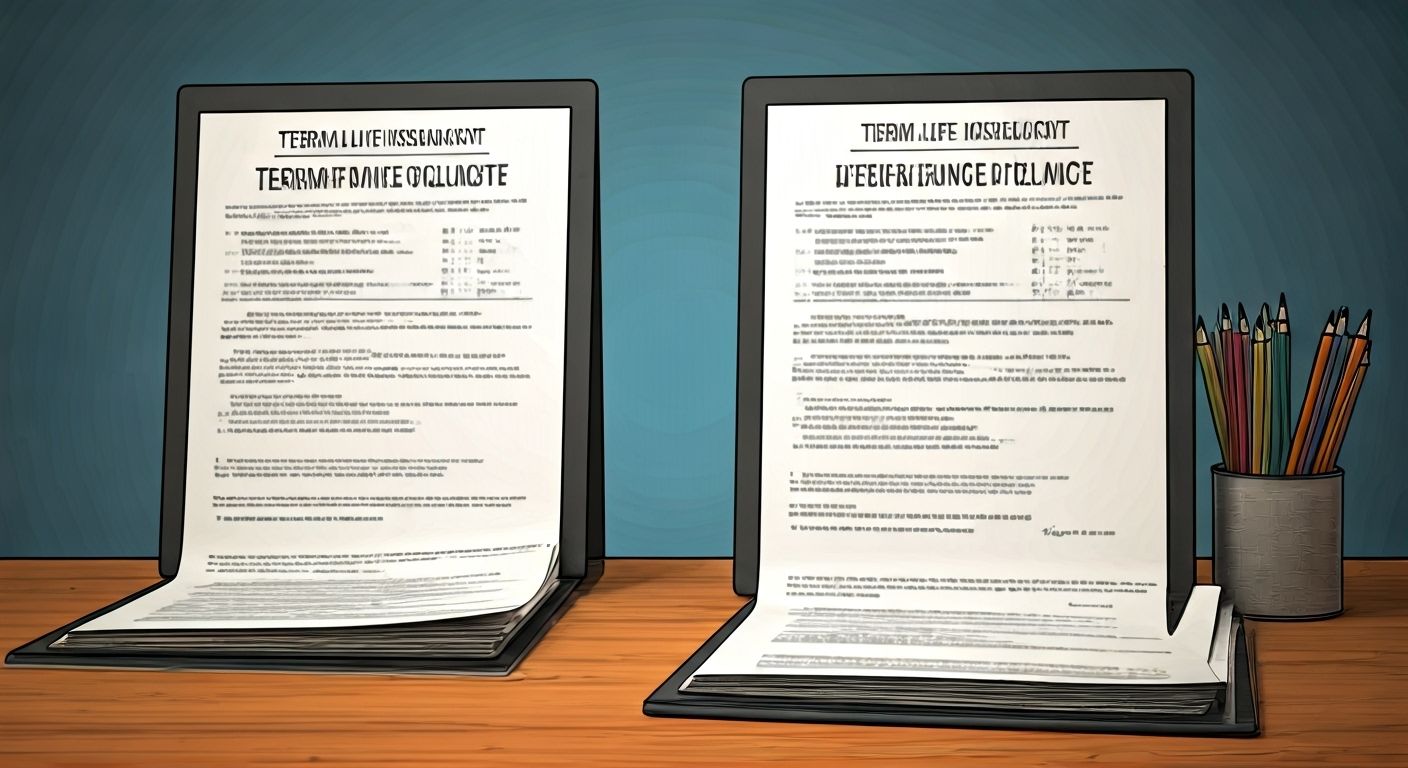
Key Highlights
- Term life insurance provides financial protection for your loved ones for a set period of time.
- Your term life insurance policy offers a death benefit that is paid to beneficiaries if the insured dies during the term.
- You pay premium payments regularly to maintain coverage, and these premiums are often fixed for the duration of the policy.
- Policies allow flexibility, with term lengths typically ranging from 10 to 30 years.
- Most insurance companies offer additional features, such as the option to convert to a permanent life insurance policy.
- Term life insurance is an affordable solution for temporary coverage tailored to individual needs.
Introduction
Planning for the future is very important. This is where term life insurance comes in. A term life insurance policy gives your family the financial protection they need, but only for a set amount of time. This type of life insurance can give fast security without costing too much. If you have some financial obligations, like paying for a home or caring for kids, and you want coverage for just a few years, a term life policy can help with that. So, let’s look at term life insurance and see why it might be a good choice for you.
What Is Term Life Insurance?

Term life insurance is a type of life insurance that gives you coverage for a specific period, usually from 10 to 30 years. You have to make regular premium payments during this time. If you die within this period, the people you name—your beneficiaries—get a death benefit. Unlike whole life insurance or other permanent policy types, term life insurance is meant for temporary needs, so it costs less.
One of the good things about term insurance is how simple and cheap it is. If you live past the set period, the coverage ends. You will not get your money back unless your policy lets you switch to a permanent policy. This is why term life insurance is best for people who want financial protection for things like paying off debt or raising their children.
Key Features of Term Life Insurance
The structure of term life insurance is simple and useful for many people. It also fits different needs. Here are some things that make it stand out:
- Temporary coverage: It gives you security for a set period. This helps you line up your coverage with what you need for your money plans.
- Death benefit: If the person with the policy dies during the set time, the insurance will give the people they choose a cash payment.
- Fixed period: You can pick the length of the policy, like 10, 20, or 30 years. You can match this with your own goals.
- Insurance company options: Some policies have extra benefits, or riders, like being able to change your policy into a permanent life insurance policy.
Unlike whole life policies, term life insurance does not build any cash value. Because the coverage is only for a set time, this works well when you have a lot of financial responsibility for a few years. The premium payments for this kind of life insurance are often lower, so it can be a good choice if you want strong, targeted protection and do not want to pay too much.
How Term Life Insurance Works in the United States
Getting term life insurance is simple with most life insurance companies. The approval process usually starts when you answer some health questions. Sometimes, you have to get a medical exam, too. These things help the insurer know what the risk is and what your payments should be.
Once you get approved, your coverage starts for a set period of time. You pick how long—10, 20, or 30 years. As long as you keep up with your premium payments, the life insurance company will pay a death benefit to your loved ones if something happens to you.
Some term life insurance policies let you switch to permanent coverage. This means you can change plans without any more checks or tests. This option helps you adjust your coverage as your life changes. That way, you get peace of mind while also taking care of temporary needs.
Types of Term Life Insurance Policies

When you look at the types of life insurance, there are many term policy options.
Level term insurance is simple. It gives a fixed death benefit and your payments stay the same during the whole term. There is also decreasing term insurance. This one gives less coverage as time goes by, so it works well if you want to pay for a mortgage or take care of other financial obligations that get lower over the years.
Some insurance policies come with other features. For example, a convertible term policy lets you switch to permanent coverage later. A return-of-premium policy will give your premiums back if you live past the end of the term. When you understand these kinds of life insurance and what they offer, it helps you find a term insurance plan that fits your own needs and financial goals.
Level Term vs. Decreasing Term
Here’s a look at how level term and decreasing term insurance policies compare:
| Feature | Level Term Insurance | Decreasing Term Insurance |
|---|---|---|
| Death Benefit | Stays the same the whole length of time of the policy | Goes down as the policy goes on |
| Premium Payments | Stays the same during the term | Usually stays the same |
| Ideal for | Long-term financial obligations like childcare or college tuition | Debts that go down over time like mortgages or loans |
| Cost | The price is a bit higher because the death benefit does not change | Starts out lower but your coverage decreases |
Choosing between level term life insurance and decreasing term is about what you need at each point in time. Both types of term life insurance give you a way to get the protection you want. You can match your insurance policies to your own plans and needs.
Renewable and Convertible Term Options
Renewable term and convertible term policies give you more ways to manage the changes you might face over time.
A renewable term policy lets you keep your coverage after the original set period of time is over. You do not need to get new approval, but your premium payments will usually go up every time you renew. This type of term policy is good if you just need life insurance for a short time. But, over the years, the cost can get high.
With a convertible term plan, you can change your policy from a short-term one to a permanent policy. You will not have to take a medical exam to do so. The chance to switch is often part of many term life insurance plans. This makes sure you always have life insurance coverage, no matter how your needs change. There is an additional cost for this extra feature, but it gives comfort if you know you might want or need financial protection for the long run.
Both choices help make term life insurance more flexible. They help you get and keep life insurance coverage as things in your life shift. This means you can give steady financial protection for the people close to you.
Choosing the Right Term Length and Coverage Amount
Choosing the right term length and the amount of coverage is very important. Term life insurance can be taken out for a period of 10 to 30 years. This makes it easy to match with your money needs or plans.
Your coverage should fit what you will need, like paying off what you owe or helping cover school costs. When you know what your needs are, you can choose the right length and amount. This way, your loved ones stay safe no matter what life brings.
The amount of coverage and term length matter with term life insurance and other insurance policies. Picking what is right for you will help those you care about if something happens.
Factors to Consider When Selecting a Policy
When you look at a term life insurance policy, you need to think about a few main things:
- Financial obligations: Think about any money you owe. This includes things like the mortgage, your child’s school fees, or childcare costs.
- Years of coverage: Pick a policy that lasts as long as your biggest financial need. Make sure the policy fits the amount of time you need.
- Health questions: Some policies ask things about your health or may need you to have a medical exam.
- Amount of time: Pick coverage that fits your family’s needs. This helps keep their future safe.
To choose the right life insurance, look at what you need now and what you will need later. If you keep these things in mind, you can pick a life insurance policy that helps protect the people you care about.
Common Mistakes to Avoid When Buying Term Life Insurance
Buying term life insurance coverage takes some care to make sure you do not fall into common traps.
- Underinsuring: If you pick a policy that does not have enough life insurance coverage, your loved ones could face money problems.
- Overpaying: If you get too much life insurance, you might end up making premium payments that are higher than you need.
- Ignoring convertibility: If you do not choose a policy with this feature, you may have less freedom to change in the future.
- Overlooked details: If you skip reading all the fine print, you might miss out on some useful things the policy gives.
Try to avoid these mistakes by looking closely at every type of policy on offer. This way, you can make sure your term life insurance fits your own needs and money plans.
Conclusion
To sum up, knowing about term life insurance is very important for keeping your family’s money safe in the future. When you go through the main features and types of life insurance, you get the help you need to pick the right plan. Think about the most important things before you make your final choice. Try to avoid common mistakes so your policy will meet your long-term goals. Remember, getting life insurance is about more than just having a plan. It is also about giving you and your family peace of mind. If you want to find out more or talk with someone about what works for you, you can get a free talk with our experts today.
Frequently Asked Questions
What happens if I outlive my term life insurance policy?
If you live longer than the years covered by your term life policy, the temporary coverage will stop. In this case, there will not be any death benefit for your family. You can choose to renew the policy, change it into permanent coverage, or buy a new policy to keep your protection going.
Can I convert my term life insurance to permanent coverage?
Yes, many insurance companies let you change term life insurance to whole life insurance or another type of permanent coverage. With this change, you do not need to go through the approval process again. This helps you keep your coverage without any gap. It’s a good idea to check with your insurance company to find out their rules about this.
Does term life insurance have any cash value?
No, term life insurance does not build cash value. Unlike whole life insurance, it only gives temporary coverage for a specific period of time. If you want your life insurance to grow cash value, you should look at a permanent policy instead.
How are premiums determined for term life insurance?
Premium payments can go up or down because of things such as your age, health questions you answer, overall risk, the term length you pick, and rules that the insurance company follows. A medical exam can also change how much you pay for your policy, depending on what it shows about your health.
Is a medical exam always required to get term life insurance?
No, you do not have to take a medical exam for every life insurance policy. Some types, like simplified or guaranteed issue life insurance, let you skip the medical exam. But these often cost more, and you may pay higher premiums. It is a good idea to talk to your insurance company to understand what the exact rules are for your situation.

